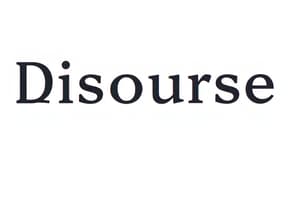Podcast
Questions and Answers
Discourse analysis (DA) is solely focused on the literal meaning of texts.
Discourse analysis (DA) is solely focused on the literal meaning of texts.
False (B)
Discourse analysis examines not just language, but also the societal implications of language use.
Discourse analysis examines not just language, but also the societal implications of language use.
True (A)
One purpose of discourse analysis is to uncover hidden motivations in both the text and the researcher.
One purpose of discourse analysis is to uncover hidden motivations in both the text and the researcher.
True (A)
The term 'colonization' is viewed as having negative connotations in discourse analysis.
The term 'colonization' is viewed as having negative connotations in discourse analysis.
DA does not consider the social contexts when analyzing a discourse.
DA does not consider the social contexts when analyzing a discourse.
Ideology refers to a specific set of beliefs and assumptions that people have about what is good and bad.
Ideology refers to a specific set of beliefs and assumptions that people have about what is good and bad.
Genre analysis focuses solely on the aesthetic qualities of literary texts.
Genre analysis focuses solely on the aesthetic qualities of literary texts.
The ideational function of language involves creating or negotiating relationships with others.
The ideational function of language involves creating or negotiating relationships with others.
Authors create versions of reality through their choice of words and constructs.
Authors create versions of reality through their choice of words and constructs.
A genre is defined as a chaotic and unrecognized communicative event.
A genre is defined as a chaotic and unrecognized communicative event.
Language does not influence how a person projects their identity.
Language does not influence how a person projects their identity.
The textual function of language is important for promoting a particular ideology.
The textual function of language is important for promoting a particular ideology.
Using language resources effectively can help in projecting a certain kind of identity.
Using language resources effectively can help in projecting a certain kind of identity.
All functions of language are unrelated to ideological promotion.
All functions of language are unrelated to ideological promotion.
Writing or speaking involves using specific resources to assert one's identity.
Writing or speaking involves using specific resources to assert one's identity.
The words we use in writing or talking are purely arbitrary.
The words we use in writing or talking are purely arbitrary.
Different identities and activities can be recognized through the use of symbols and objects.
Different identities and activities can be recognized through the use of symbols and objects.
Acting and interacting in society does not influence how we recognize different beliefs.
Acting and interacting in society does not influence how we recognize different beliefs.
Using symbols in the right times is essential for effective communication.
Using symbols in the right times is essential for effective communication.
Conversations are influenced solely by the literal meanings of the words used.
Conversations are influenced solely by the literal meanings of the words used.
Integrating multiple types of texts can help clarify the content of a specific article.
Integrating multiple types of texts can help clarify the content of a specific article.
The goal of any text is to confuse the reader about its content.
The goal of any text is to confuse the reader about its content.
A specific text can be analyzed in isolation without regard to other texts.
A specific text can be analyzed in isolation without regard to other texts.
The content of an article can become more complex when only one type of text is used.
The content of an article can become more complex when only one type of text is used.
Achieving the goal of a text requires understanding its context.
Achieving the goal of a text requires understanding its context.
Flashcards are hidden until you start studying
Study Notes
Discourse Analysis (DA)
- DA aims to uncover hidden motivations behind texts and research methods.
- DA helps to understand our own and others' hidden motivations, solving problems by encouraging ontological and epistemological questions.
- Studies the ways sentences and speech create texts and interactions, and how these fit into society.
- Examines language and its interpretation.
DA Considerations
- DA goes beyond the literal meaning of texts, considering social and historical contexts.
- It analyzes the implications of using different words, for example, "colonization" vs. "occupation."
- It recognizes the different connotations of terms like "occupation" (negative) and "colonization" (positive).
Discourse and Ideology
- Ideology is a set of beliefs and assumptions about what is good, bad, right, wrong, normal, and abnormal.
- How Text Promotes Ideology:
- Authors create versions of reality by choosing specific words.
- Authors construct relationships between themselves and their readers.
- Authors appropriate and represent the words of others.
Texts and Social Functions
- Genre refers to a recognizable communicative event with specific purposes, understood by members of its community.
- Genre Analysis studies the social functions of different types of texts.
Who Doing What
- Halliday (1994) identified three functions of language:
- Ideational Function: Language represents the world.
- Interpersonal Function: It creates and negotiates relationships.
- Textual Function: It joins sentences and ideas cohesively.
Whos & Whats
- Language choices project a certain identity, reflecting one's way of thinking, acting, interacting, and believing.
- Different symbols and objects are used to recognize different identities and activities.
- In conversation and writing, words are not used arbitrarily.
- Different types of texts can be integrated within one text to clarify content and achieve a specific goal.
Studying That Suits You
Use AI to generate personalized quizzes and flashcards to suit your learning preferences.




